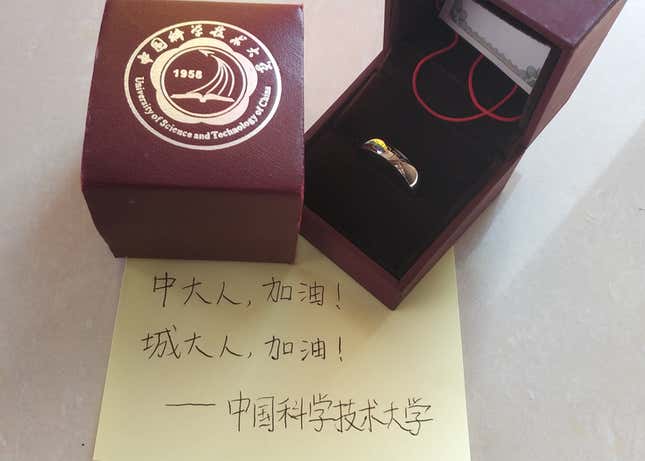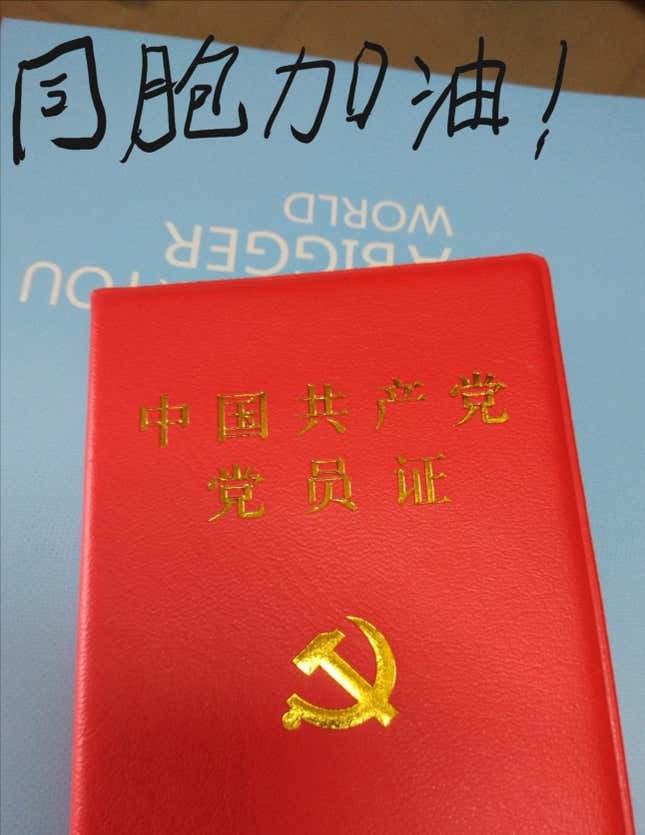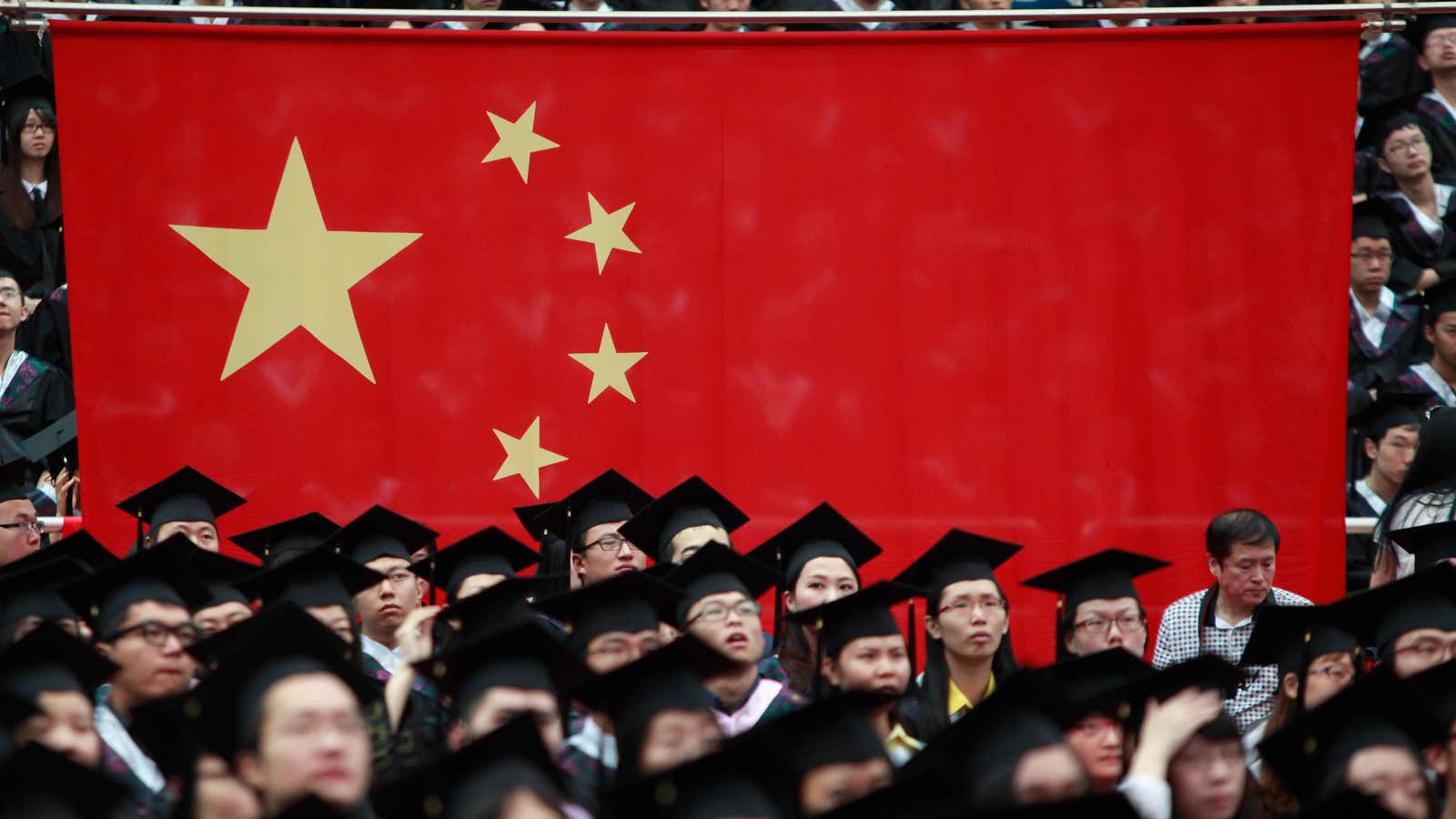In China, it’s nearly impossible to talk about the events of 30 years ago, when tanks rolled into Beijing’s Tiananmen Square and an untold number of student protesters were killed. But the recent turn in protests in Hong Kong, with fierce clashes breaking out between police and university students, has compelled some mainland Chinese students to evoke the bloody crackdown of 1989.
This month Hong Kong saw two prominent schools, the Chinese University of Hong Kong (CUHK) and Hong Kong Polytechnic University, become fiery battlegrounds. At the latter, where students blocked a vital tunnel link, a police siege has lasted days, with protesters trying to escape via sewers and by shimmying down ropes to avoid violent arrest and beatings. The protest movement, which initially erupted over a now-withdrawn bill that would have allowed extradition of suspects to mainland China, is now in its sixth month, and the campus battles mark the most violent encounters yet, prompting fears of a bloody crackdown—and notes of support from people identifying themselves as Chinese nationals.
While these sentiments reflect a minority, they mark an effort to publicly reject the opinions China’s censorship regime has allowed to circulate on social media platforms like Weibo. There, people overwhelmingly echo the hardline stance of the ruling Communist Party, and call for the Hong Kong police to take “forceful” action against “rioters” who are depicted in state-run media as instigated by foreign governments.
“There are two key words in their life: loneliness, for not being able to tell their thoughts openly in China, and pain, for feeling sad for what happened in Hong Kong,” the man behind @midwaydude, an anonymous Twitter handle that has been publishing letters from mainland Chinese expressing solidarity with Hong Kong, told Quartz.
Standing—secretly—with Hong Kong
A Hong Kong citizen who moved to the city from the mainland as a child, @midwaydude gained online prominence in China with posts trying to explain Hong Kongers and mainland Chinese to one another. After being barred from Chinese social media platform Weibo, he migrated to Twitter where he uses his account as a safe channel for people in China to voice countercultural views without facing retaliation from Chinese authorities or trolls. He declined to disclose his actual name.
On Nov. 13, a day after police stormed onto the CUHK campus firing tear gas and rubber bullets as protesters responded with bricks and Molotov cocktails, he began a thread of notes he had received via Twitter direct messages from mainland Chinese, now numbering 34 notes. In the messages, many say the sieges brought to mind the democratic student movement that began in April 1989, and ended in bloodshed less than two months later—Beijing has never disclosed how many died, but estimates range from several hundred to several thousand. In Hong Kong, an estimated 1 million marched in support of the students that year.
“Hong Kong people, please forgive that we cannot stand with you openly, but we hope you will understand that we are not your enemies. I wish you could get the freedom that some Chinese students failed to get 30 years ago. May the glory be with Hong Kong!” said one person identifying themselves as a mainland Chinese student overseas.
In another note, a mainland Chinese citizen who claimed to be from the southern city of Guangzhou, described themselves as a “spiritual Hong Konger.” “I have never imagined that I will see June 4 2.0. You are fighting with the whole authoritarian regime, and the only thing I could do is to pray for you quietly,” said the user.
@midwaydude told Quartz he had received more than 100 notes so far, with most of them from people who told him they are students. To his surprise, over half them said they are currently living in the mainland—where it is highly risky to voice support for Hong Kong. Last week, a university opened an inquiry into a law professor in China who faced an online backlash after his remarks from a private messaging group, in which he defended Hong Kong protesters as “just a bunch of kids,” were leaked online. As the protests have endured, reviving the demand for greater democracy that drove the city’s 2014 Umbrella Movement protests, several Chinese nationals who expressed sympathy for Hong Kong on overseas social media have been doxxed by friends and acquaintances posting their personal information online.
“The normal communication channels between Hong Kongers and Taiwanese with mainlanders have basically been cut off. At least this is the case on public online platforms,” said Y, a woman from mainland China who has lived in Hong Kong for more than a decade, and was among those to send @midwaydude a note. “The channel provided by @midwaydude is a great way to reconnect people in these places, with them telling those detailed stories that have a human touch.”
“Add oil, compatriots!”
The clashes at the Hong Kong universities have also sparked support from mainland Chinese people on Pincong, a Chinese-language forum founded last year and based overseas that is popular among China’s liberals, who access it using virtual private networks. At around the same time that @midwaydude started his thread on Twitter, a Pincong user began an online campaign (link in Chinese) calling for students from mainland China and elsewhere to send encouragement to Hong Kong protesters.
User “USTCwHK” initiated the campaign by posting a photo of their student certificate and graduation ring from the University of Science and Technology of China in Anhui province, as well as a Post-it note that reads, “Add oil, CUHK students! Add oil, (City University) students!” The slogan—jia you in mandarin—is a Chinese phrase used to encourage people to keep going in an endeavor. The Cantonese version, ga yau, is a protest slogan in Hong Kong.

The campaign has garnered over 800 comments and over 100 photos from supporters, most of whom identify themselves as students at mainland Chinese schools, or Chinese studying at overseas ones, including the University of Cambridge, Harvard University, and Massachusetts Institute of Technology. The reference to the Tiananmen protests is also rife in the Pincong campaign.
“30 years ago, Hong Kong supported June 4. Today, mainland Chinese university students also support Hong Kong,” one user said in a comment. A large number of the notes thanked Hong Kong for its long-standing support of June 4, as the city still holds annual vigils to remember those died in the movement.

Most of the supporters adopted the same format for photos used by USTCwHK, showing their Chinese IDs, bank cards, or their student or graduation certificates, though with identifying information blurred or hidden—alongside words of encouragement written on note paper. Another user cited a line from George Orwell’s dystopian novel 1984: “We shall meet in the place where there is no darkness.”
One note even claimed to be from a member of the Communist Party, with a photo showing the red embossed certificate given to party members alongside the words, “Add oil, compatriots!”
